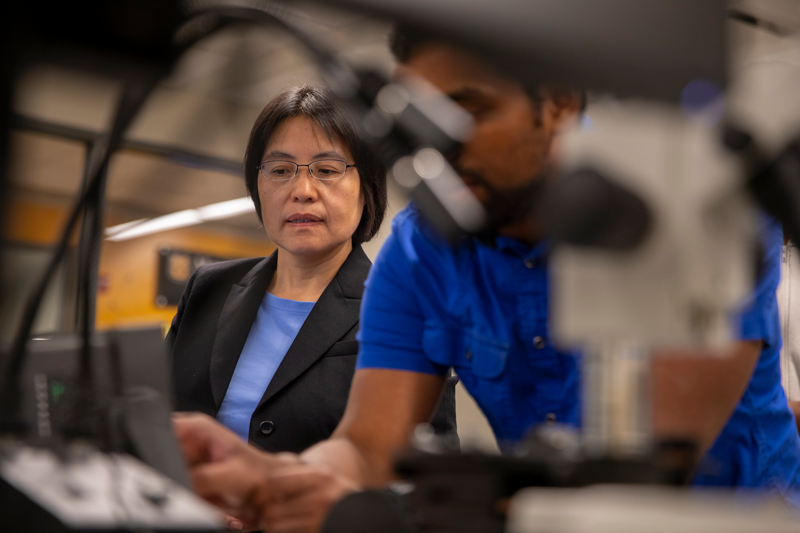November 01, 2023

LED lighting is replacing traditional incandescent lighting across the country. These light-emitting diodes are energy efficient, but also problematic. Not only are they costly, they also emit harsh blue lighting that’s polluting our night sky and interrupting our sleep patterns.
Mizzou Engineering’s Peifen Zhu is coming up with better solid-state lighting technology. In a ground-breaking study — which made the cover of Applied Electronic Materials last month — Zhu and her team outlined a process using 3D printing to simplify the manufacturing of stable lighting technology. The work comes on the heels of the Biden administration’s recent decision to enforce a long-delayed rule banning the sale of most traditional incandescent light bulbs.

Zhu’s technology utilizes perovskites, a class of earth-abundant materials that can shine brightly and be adjusted to emit different colors of light. While they’re known for efficiency, perovskites are also instable, which has posed a challenge when it comes to incorporating them in everyday products.
“This material is very efficient but not stable, so we’re trying to find ways to stabilize it so it can be used in many applications, in our case solid-state lighting,” said Zhu, an assistant professor of electrical engineering and computer science. “Basically, this work bridges the gap between perovskites and their potential applications.”
Zhu and her team leveraged 3D printing to create resin-perovskite color conversion layers. Using an affordable 3D printer, they mixed perovskite nanocrystals capable of emitting green, yellow and red light with a transparent ultraviolet resin. The combination resulted in a thin color conversion layer that transformed UV light into various colors and demonstrated a high level of stability.
Researchers then stacked these layers onto a UV light-emitting diode chip, producing a natural white light.
“Because 3D printing is inexpensive, it significantly lowers production cost,” Zhu said. “This method could lead to a cheaper way to mass produce higher quality, energy efficient lighting.”
Zhu joined Mizzou Engineering last year with funding from a Faculty Early Career Development (CAREER) Award from the National Science Foundation.
While her research team and facilities have grown — she now occupies lab space in both Lafferre and Naka halls — Zhu continues to seek students to be part of her work. Interested undergraduates and graduate students may contact her directly.
Help create a brighter future. Apply to Mizzou Engineering today!